An interview article speaking candidly has been published.I will attach the image of the article below, but for easier reading, I will also paste the text underneath the image.
I believe the article gives a rough outline of François Dubois.
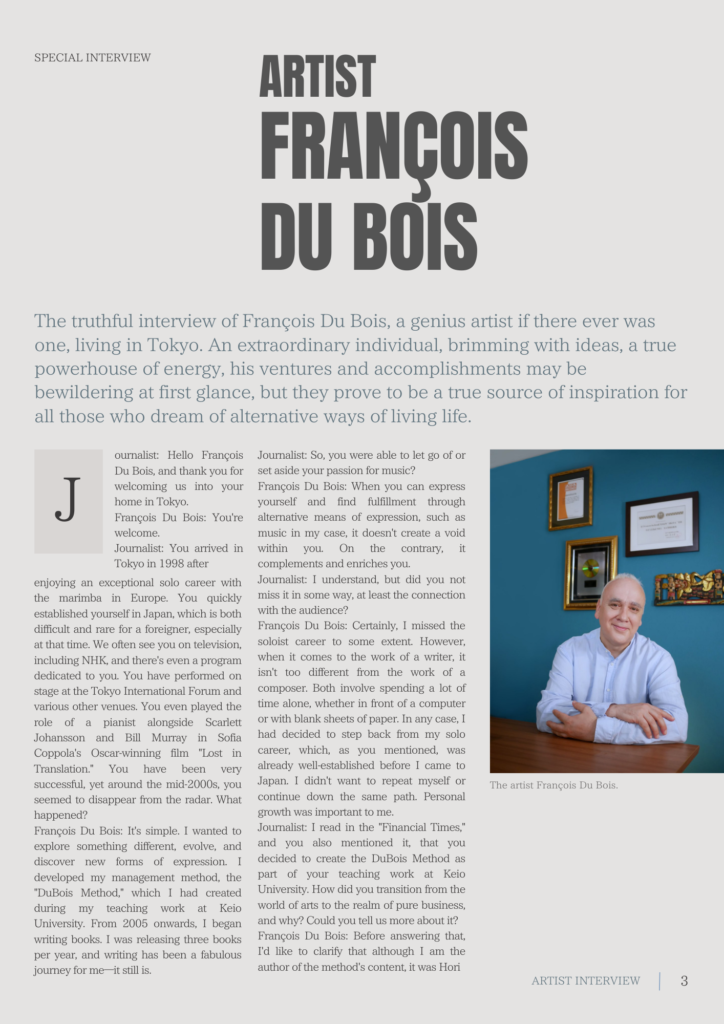
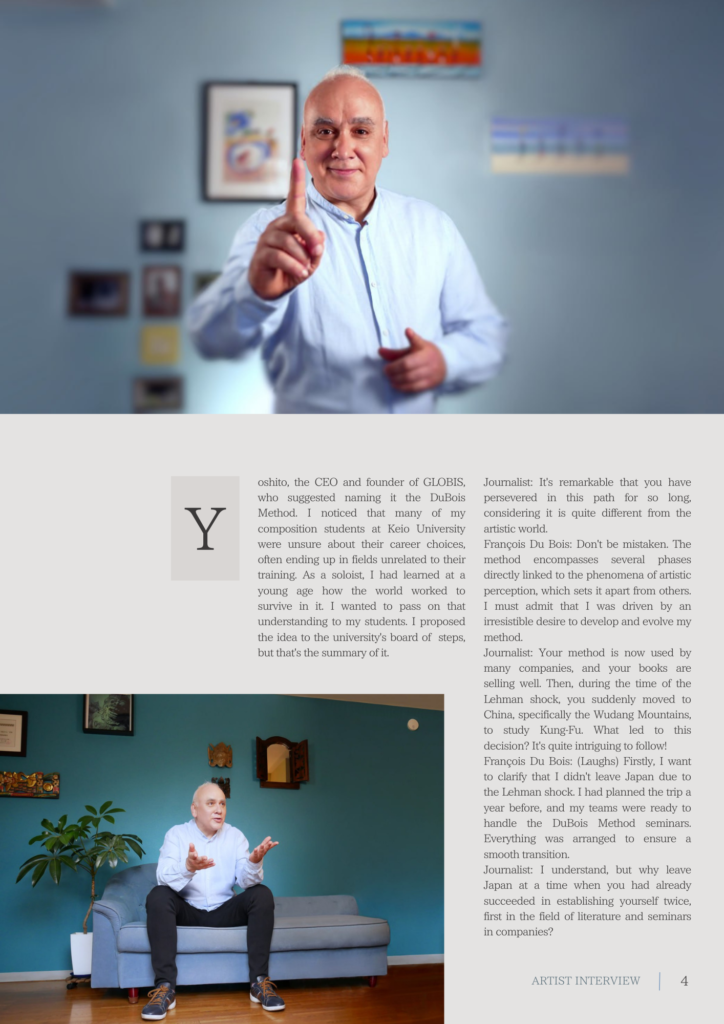
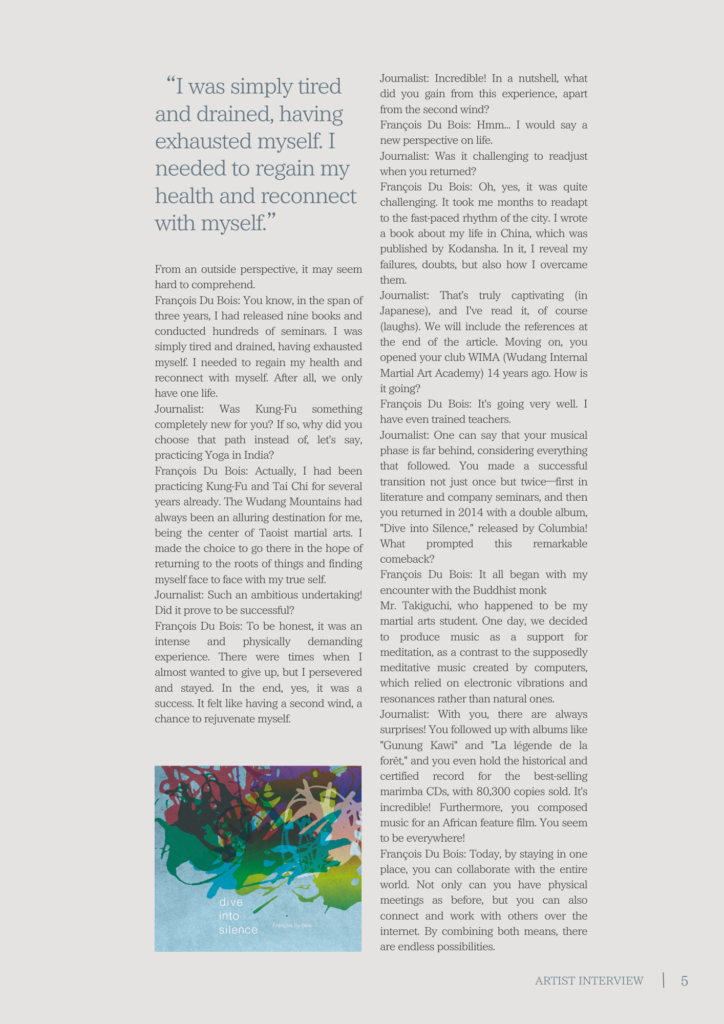
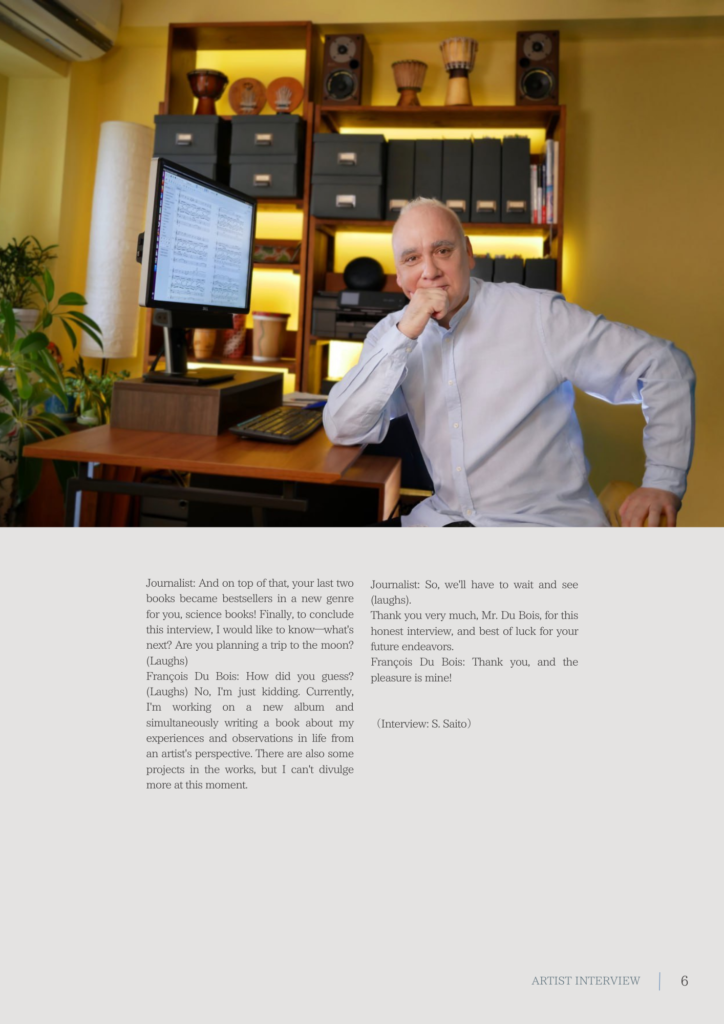
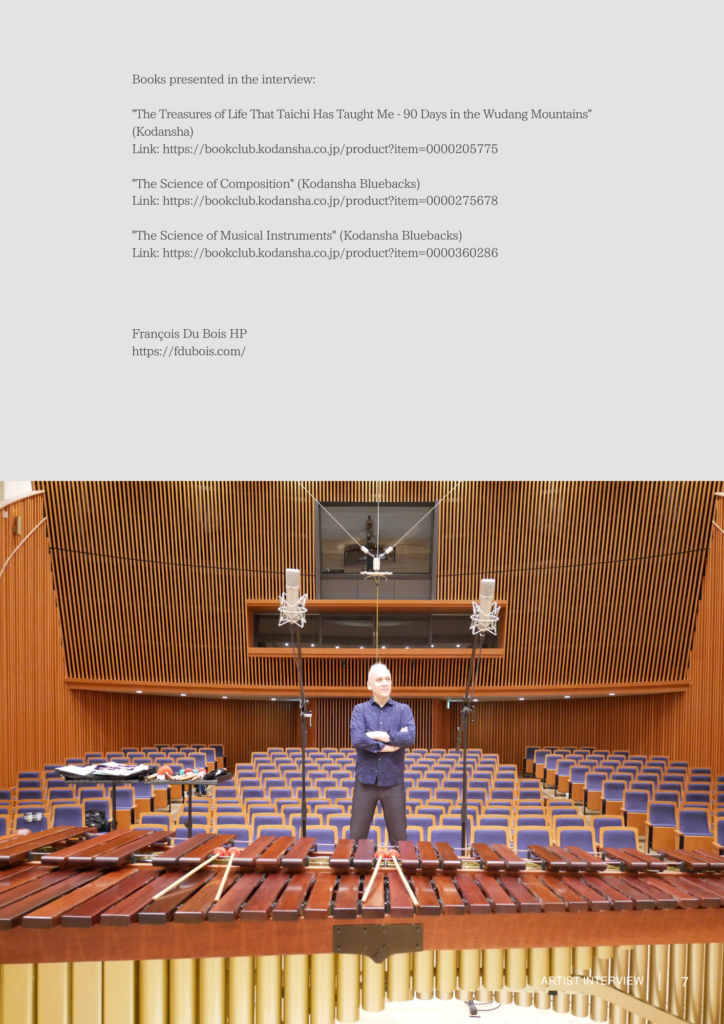
The truthful interview of François Du Bois, a genius artist if there ever was one, living in Tokyo.
An extraordinary individual, brimming with ideas, a true powerhouse of energy, his ventures and accomplishments may be bewildering at first glance, but they prove to be a true source of inspiration for all those who dream of alternative ways of living life.
Journalist: Hello François Du Bois, and thank you for welcoming us into your home in Tokyo.
François Du Bois: You’re welcome.
Journalist: You arrived in Tokyo in 1998 after enjoying an exceptional solo career with the marimba in Europe. You quickly established yourself in Japan, which is both difficult and rare for a foreigner, especially at that time. We often see you on television, including NHK, and there’s even a program dedicated to you. You have performed on stage at the Tokyo International Forum and various other venues. You even played the role of a pianist alongside Scarlett Johansson and Bill Murray in Sofia Coppola’s Oscar-winning film “Lost in Translation.” You have been very successful, yet around the mid-2000s, you seemed to disappear from the radar. What happened?
François Du Bois: It’s simple. I wanted to explore something different, evolve, and discover new forms of expression. I developed my management method, the “DuBois Method,” which I had created during my teaching work at Keio University. From 2005 onwards, I began writing books. I was releasing three books per year, and writing has been a fabulous journey for me—it still is.
Journalist: So, you were able to let go of or set aside your passion for music?
François Du Bois: When you can express yourself and find fulfillment through alternative means of expression, such as music in my case, it doesn’t create a void within you. On the contrary, it complements and enriches you.
Journalist: I understand, but did you not miss it in some way, at least the connection with the audience?
François Du Bois: Certainly, I missed the soloist career to some extent. However, when it comes to the work of a writer, it isn’t too different from the work of a composer. Both involve spending a lot of time alone, whether in front of a computer or with blank sheets of paper. In any case, I had decided to step back from my solo career, which, as you mentioned, was already well-established before I came to Japan. I didn’t want to repeat myself or continue down the same path. Personal growth was important to me.
Journalist: I read in the “Financial Times,” and you also mentioned it, that you decided to create the DuBois Method as part of your teaching work at Keio University. How did you transition from the world of arts to the realm of pure business, and why? Could you tell us more about it?
François Du Bois: Before answering that, I’d like to clarify that although I am the author of the method’s content, it was Hori Yoshito, the CEO and founder of GLOBIS, who suggested naming it the DuBois Method. I noticed that many of my composition students at Keio University were unsure about their career choices, often ending up in fields unrelated to their training. As a soloist, I had learned at a young age how the world worked to survive in it. I wanted to pass on that understanding to my students. I proposed the idea to the university’s board of directors, and they agreed to open a seminar. It quickly became successful, initially with the students and later expanded to include employees and executives for their training. I skipped a few steps, but that’s the summary of it.
Journalist: It’s remarkable that you have persevered in this path for so long, considering it is quite different from the artistic world.
François Du Bois: Don’t be mistaken. The method encompasses several phases directly linked to the phenomena of artistic perception, which sets it apart from others. I must admit that I was driven by an irresistible desire to develop and evolve my method.
Journalist: Your method is now used by many companies, and your books are selling well. Then, during the time of the Lehman shock, you suddenly moved to China, specifically the Wudang Mountains, to study Kung-Fu. What led to this decision? It’s quite intriguing to follow!
François Du Bois: (Laughs) Firstly, I want to clarify that I didn’t leave Japan due to the Lehman shock. I had planned the trip a year before, and my teams were ready to handle the DuBois Method seminars. Everything was arranged to ensure a smooth transition.
Journalist: I understand, but why leave Japan at a time when you had already succeeded in establishing yourself twice, first in the field of literature and seminars in companies? From an outside perspective, it may seem hard to comprehend.
François Du Bois: You know, in the span of three years, I had released nine books and conducted hundreds of seminars. I was simply tired and drained, having exhausted myself. I needed to regain my health and reconnect with myself. After all, we only have one life.
Journalist: Was Kung-Fu something completely new for you? If so, why did you choose that path instead of, let’s say, practicing Yoga in India?
François Du Bois: Actually, I had been practicing Kung-Fu and Tai Chi for several years already. The Wudang Mountains had always been an alluring destination for me, being the center of Taoist martial arts. I made the choice to go there in the hope of returning to the roots of things and finding myself face to face with my true self.
Journalist: Such an ambitious undertaking! Did it prove to be successful?
François Du Bois: To be honest, it was an intense and physically demanding experience. There were times when I almost wanted to give up, but I persevered and stayed. In the end, yes, it was a success. It felt like having a second wind, a chance to rejuvenate myself.
Journalist: Incredible! In a nutshell, what did you gain from this experience, apart from the second wind?
François Du Bois: Hmm… I would say a new perspective on life.
Journalist: Was it challenging to readjust when you returned?
François Du Bois: Oh, yes, it was quite challenging. It took me months to readapt to the fast-paced rhythm of the city. I wrote a book about my life in China, which was published by Kodansha. In it, I reveal my failures, doubts, but also how I overcame them.
Journalist: That’s truly captivating (in Japanese), and I’ve read it, of course (laughs). We will include the references at the end of the article. Moving on, you opened your club WIMA (Wudang Internal Martial Art Academy) 14 years ago. How is it going?
François Du Bois: It’s going very well. I have even trained teachers.
Journalist: One can say that your musical phase is far behind, considering everything that followed. You made a successful transition not just once but twice—first in literature and company seminars, and then you returned in 2014 with a double album, “Dive into Silence,” released by Columbia! What prompted this remarkable comeback?
François Du Bois: It all began with my encounter with the Buddhist monk Mr. Takiguchi, who happened to be my martial arts student. One day, we decided to produce music as a support for meditation, as a contrast to the supposedly meditative music created by computers, which relied on electronic vibrations and resonances rather than natural ones.
Journalist: With you, there are always surprises! You followed up with albums like “Gunung Kawi” and “La légende de la forêt,” and you even hold the historical and certified record for the best-selling marimba CDs, with 80,300 copies sold. It’s incredible! Furthermore, you composed music for an African feature film. You seem to be everywhere!
François Du Bois: Today, by staying in one place, you can collaborate with the entire world. Not only can you have physical meetings as before, but you can also connect and work with others over the internet. By combining both means, there are endless possibilities.
Journalist: And on top of that, your last two books became bestsellers in a new genre for you, science books! Finally, to conclude this interview, I would like to know—what’s next? Are you planning a trip to the moon? (Laughs)
François Du Bois: How did you guess? (Laughs) No, I’m just kidding. Currently, I’m working on a new album and simultaneously writing a book about my experiences and observations in life from an artist’s perspective. There are also some projects in the works, but I can’t divulge more at this moment.
Journalist: So, we’ll have to wait and see (laughs).
Thank you very much, Mr. Du Bois, for this honest interview, and best of luck for your future endeavors.
François Du Bois: Thank you, and the pleasure is mine!
Books presented in the interview:
“The Treasures of Life That Taichi Has Taught Me – 90 Days in the Wudang Mountains” (Kodansha)
Link: https://bookclub.kodansha.co.jp/product?item=0000205775
“The Science of Composition” (Kodansha Bluebacks)
Link: https://bookclub.kodansha.co.jp/product?item=0000275678
“The Science of Musical Instruments” (Kodansha Bluebacks)
Link: https://bookclub.kodansha.co.jp/product?item=0000360286
